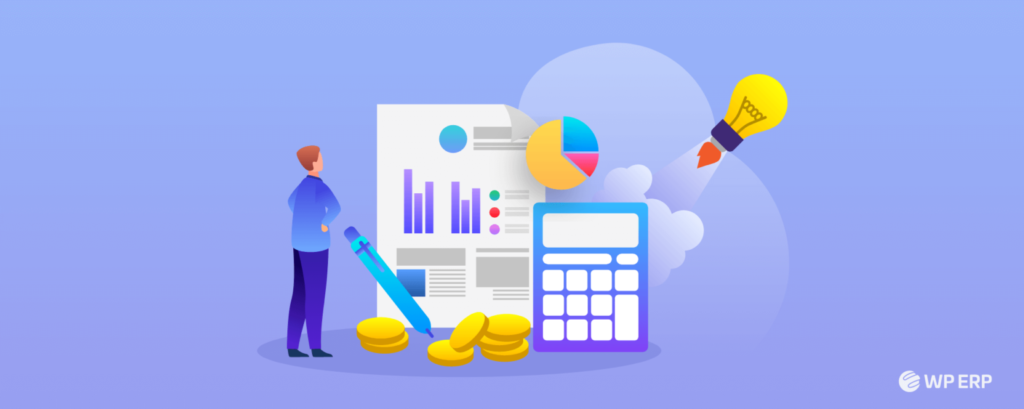Everyone will tell you to become an entrepreneur. But very few will tell you how many small businesses fall even before they start properly.
According to data from the Bureau of Labor Statistics, by the end of the decade, only 30 percent of new businesses survive — thus accumulating a 70 percent failure rate.
Does that mean you should not start a business? No, that is absolutely not what we meant!
In fact, starting your own business is still the smartest way to earn your living and create a better future. However, in order to avoid getting failed, it is important to plan and create a systematic way to run your business.
When it comes to the success of a small business, one of the things that should be your priority is to ensure a better accounting management system is in place. In this article, we will go over the term “accounting management system”. We will also get to know why is it so important for small businesses and what tool you can use.
What is Accounting Management System?

An accounting management system or accounting management software helps businesses to keep track of all incomes, expenses, and every other financial transaction. It also helps business owners to get the data that they need for making business decisions.
Accounting management systems primarily help you streamline 4 key things, which are –
- General Ledger
- Accounts Receivable (AR)
- Accounts Payable (AP)
- Banking and Cash Management
Later on in this article, we will talk about all these parts of accounting management. We will also inform you how an accounting management system or accounting management software can help you take care of them effortlessly.
Features of Accounting Management System

There are four major parts of accounting that an accounting management system helps you with. Now let’s get to know all of them.
1. General Ledger
A general ledger is a record book containing all the transaction details of a company. They help you get the data of every debit and credit transaction. These data include the date, description, amount, and other crucial information.
Even if you run a small business, manual collection, input, and calculation of these data can take a lot of time and effort. However, an account management system can make it quite easy to maintain a general ledger.
2. Accounts Receivable (AR)
Accounts receivable is an account that stores the data of all the money that third parties owe to you. These third parties can be customers, business affiliates, and even banks.
A business has a lot of account receivables to keep track of on day to day basis. These data can also be maintained efficiently using proper account management software.
Related: Best Accounting Software for Small Business
3. Accounts Payable (AP)
Accounts payable, also known as AP in short form is the money you owe to other businesses, customers, or banks. Managing accounts payable is an essential task for accountants. But this repetitive and time-consuming task can also be handled by computer-based accounting software.
4. Banking and Cash Management

Every business has to deal with numerous transactions over bank or cash. Imagine managing all these transactions with just pen and paper! That’s how much work needs to be done by an accountant if this were to be done in the analog method.
Well, the easier way is to implement an account management system to simplify and reduce the time needed to store and manage all the transactions.
Who Needs Accounting Management System
After knowing about the parts of accounting management system, you might be thinking, “is it important for my business”.
Let us make you clear.
Truth is, no matter what your business size is, you would need an accounting management system.
While the larger companies need it for handling large amount of financial data. The small to medium companies need it because they have to cut cost on hiring more manpower on accounting department. But for the small businesses needs it more than the larger companies.
Why? Let’s get to know.
Importance of Accounting Management Systems for Even Small Businesses

Out of 100 businesses in the United States, 99 are SMBs or small-to-medium scale businesses. As of 2020, there were 31.7 million SMBs in the U.S in total.
But this number is endangered with a 70% fail rate.
It is not hard to guess that a lot of small business fails because of bad money management. When you have an accounting management system in place, you can easily manage and track how the transactions are being made.
Furthermore, a small business often has fewer number employees and a low profit margin. Most of the time this means that they can’t afford the luxury of having a team of accountants. However, with the help of an account management system, you can easily do the job of four or five with just one accountant.

The definition of an accounting management system is quite simple and straightforward. However, as you can see, the importance and impact of an accounting management system are far-reaching.
A large number of transactions forces large businesses to use accounting management systems. In the case of small businesses, it is needed because they have access to less capital and manpower. Albeit for the latter type of business, the accounting management system also has to be an affordable one.
This brings us to the next part of our article, where we will talk about WP ERP Accounting Module, an affordable way for small businesses to manage the accounting front.
WP ERP Accounting – The Accounting Management System Your Business Needs

We know small businesses can not afford the best accounting management software because of the high pricing. But what if we tell you there’s also an affordable solution that offers all the features that your small business needs?
WP ERP is the tool we are talking about. It is a WordPress plugin that helps to optimize your small business with HRM, CRM, Project Management, and Accounting Management.
The dedicated Accounting module of WP ERP can be an affordable way into the accounting management system for small businesses. How it can help you in the management of your financial accounts? Let’s find out.
- The easy-to-use features of WP ERP Accounting help business owners and accountants to manage trial balance, ledger reports, balance sheets, income statements & more without any hassle.
- You can also handle invoices & receive payments.
- Automatic tax calculation.
- Advanced reposts and statements.
- 7 extension for WP Hive Accounting to extend the functionalities of the module.
With all these features, pricing of WP ERP starts from just $12.99/month!
Wrapping Up
The accounting management system is often misunderstood and thought to be only needed for large businesses with more transactions. But the reality is, it is equally important for small businesses if not more.
In this blog, we discussed about the key parts of accounting management, which are General Ledger, Accounts Receivable (AR), Accounts Payable (AP), Banking and Cash Management.
With an efficient account management system, all these can be handle efficiently. With WP ERP Accounting, even small businesses can use a proper account management system. Moreover, you will get HRM, CRM with along with it to make your business process smooth. After all, proper financial management is what keeps a business from failing.
Are you convinced to use an accounting management system?







